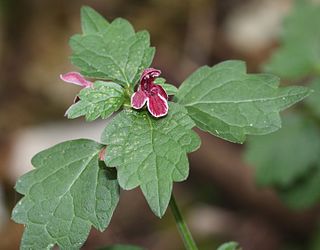Heliotropium pannifolium, the Saint Helena heliotrope, is now extinct but was formerly a hairy-leaved small shrub in the family Boraginaceae. It grew to a height of up to 1 m. It was only seen once, by the explorer W. Burchell in Broad Gut, Saint Helena and has never been seen again. Human impact on the island of Saint Helena was severe and the Saint Helena heliotrope is one of several extinct plants from that island.
Ormosia hosiei is a species of flowering plant in the family Fabaceae.
Scalesia retroflexa is a species of flowering plant in the family Asteraceae. It is found only in the Galápagos Islands of Ecuador. It is threatened by habitat loss.

Asarum maximum is a species of plant in the family Aristolochiaceae. It is endemic to China. The flowers have a distinct smell of mushrooms.
Excoecaria benthamiana is a species of flowering plant in the family Euphorbiaceae. It is endemic to Seychelles.
Polyscias crassa is a species of plant in the family Araliaceae. It is endemic to Seychelles. It is threatened by habitat loss.
Oreopanax sanderianus is a species of plant in the family Araliaceae. It is found in Guatemala, Honduras, and Mexico. It is threatened by habitat loss.
Saurauia oreophila is a species of flowering plant in the family Actinidiaceae. It is found in Guatemala and Mexico. It is threatened by habitat loss.
Saurauia scabrida is a species of flowering plant in the family Actinidiaceae. It is endemic to Mexico.

Dalbergia retusa is a plant species in the familyFabaceae . It is found in Pacific regions of Central America, ranging from Panama to southwestern Mexico. It produces the cocobolo wood. It is a fair-sized tree, reported to reach 20–25 m in height. This is probably the species contributing most of the wood in the trade. Because of the wood's great beauty and high value, the trees yielding this wood have been heavily exploited and are now rare outside national parks, reserves, and plantations.

Cornus controversa, syn. Swida controversa, is a species of flowering plant in the dogwood family Cornaceae. It is native to China, Korea, the Himalayas and Japan. It is a deciduous tree growing to 50 ft (15 m), with multiple tiered branches. Flat panicles of white flowers appear in summer, followed by globose black fruit. Ovate dark green leaves are glaucous underneath and turn red-purple in autumn. It is cultivated in gardens and parks in temperate regions.

Lobelia rhynchopetalum, the giant lobelia, is a flowering plant in the family Campanulaceae. It is endemic to Ethiopia. Its habitat is the Afroalpine climate of the Semien Mountains and Bale Mountains National Park. Recent study show that it is under a threat of climate change.

Rhododendron hancockii (滇南杜鹃) is a species of flowering plant in the family Ericaceae. It is. native to Guangxi and Yunnan, China, where it grows at altitudes of 1,100–2,000 m (3,600–6,600 ft). It is a shrub or tree that grows to 2–7 m (6.6–23.0 ft) in height, with leathery leaves that are obovate or oblong-oblanceolate, 7–13 by 1.5–5 cm in size. The flowers are white with yellowish flecks.

Rhododendron concinnum (秀雅杜鹃) is a species of flowering plant in the family Ericaceae. It is native to Guizhou, Henan, Hubei, Shaanxi, Sichuan, and Yunnan in China, where it grows at altitudes of 2300–3000 meters. It is a shrub that grows to 1.5–3 m in height, with leaves that are oblong, elliptic, ovate, oblong-lanceolate or ovate-lanceolate, 2.5–7.5 by 1.5–3.5 cm in size. Flowers are pale pink to deep purplish red.

Loxocalyx is a genus of plants in the family Lamiaceae, first described in 1891. It is native to China and Japan.

Aloe cameronii is a species of flowering plant in the family Asphodelaceae. It is indigenous to Malawi and Zimbabwe.

Carex bermudiana, the Bermuda sedge, is a sedge in the family Cyperaceae. It is endemic to the islands of Bermuda. It is found on damp forest floors and in peat marshes and has become extremely rare. The Bermuda sedge was listed on the IUCN Red List of Threatened Species in November 2014 with Endangered status. This species is listed on the Bermuda Protected Species Act.

Lonicera hildebrandiana, the giant Burmese honeysuckle, is a species of flowering plant in the family Caprifoliaceae. It is native to southeast Asia, in China, Thailand and Burma at elevations of 1000 to 2300 meters.
Anaxagorea crassipetala is a species of understory tree in the family Annonaceae. It is found frequently in the lowland rainforests of Costa Rica and Panama, but extends down to Peru.

Lilium bakerianum is a species of flowering plant in the family Liliaceae. It was described by Henry Collett and William Hemsley. The species is named in honor of botanist John Gilbert Baker.











